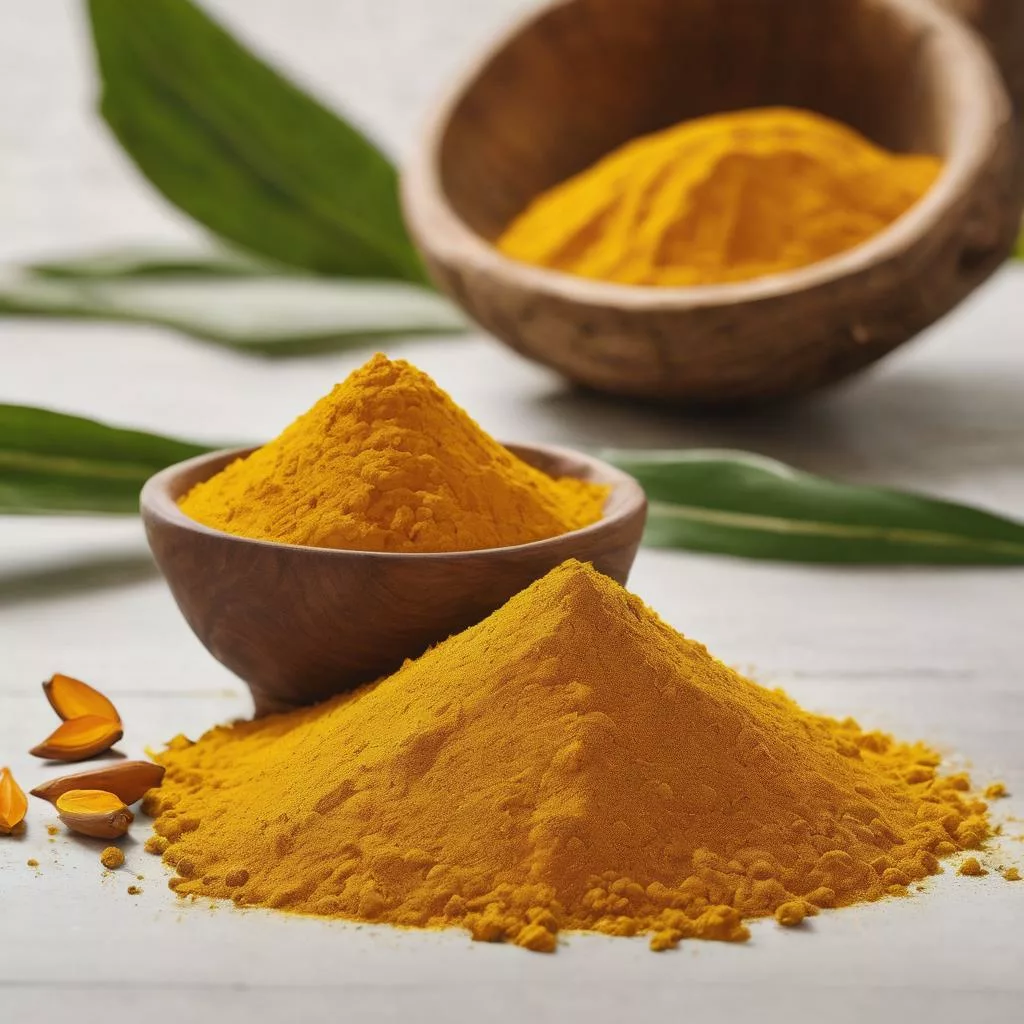
Are you curious about the potential benefits of turmeric for preventing cancer? Well, you’re in for a treat! Turmeric, with its active compound, curcumin, has been gaining attention for its cancer-fighting properties. Research suggests that turmeric may help inhibit tumor growth, reduce inflammation, and even enhance the outcomes of cancer treatment. In this article, we’ll explore the scientific evidence and shed light on the role turmeric plays in cancer prevention. So, let’s dive in and uncover the potential of this golden spice!
Key Takeaways
- Turmeric contains curcumin, which has anti-cancer effects.
- Consuming turmeric with black pepper enhances the absorption of curcumin, improving its bioavailability.
- Turmeric enhances the immune system’s ability to detect and eliminate cancer cells.
- Curcumin inhibits the growth and spread of cancer cells and has potential therapeutic benefits in various diseases.
Turmeric and Its Cancer-Fighting Properties
Turmeric boasts potent cancer-fighting properties that can significantly contribute to preventing the development of cancer. One of the key factors that makes turmeric effective in cancer prevention is its bioavailability. The term “bioavailability” describes a substance’s capacity for absorption and utilization by the body. Turmeric contains a compound called curcumin, which is responsible for its anti-cancer effects. However, curcumin has low bioavailability on its own. To enhance its bioavailability, it is often recommended to consume turmeric with black pepper, as it contains a compound called piperine that can increase the absorption of curcumin.
https://www.mdpi.com/2218-273X/9/1/13
Flax Seed: 10 Unbelievable Nutritional Knows
In addition to its bioavailability, turmeric also affects the immune system, which plays a crucial role in cancer prevention. Turmeric has been shown to modulate the activity of immune cells, such as natural killer cells and T cells, which are responsible for identifying and destroying cancer cells. By enhancing the immune system’s ability to detect and eliminate cancer cells, turmeric can contribute to the prevention of cancer.
The Role of Curcumin in Cancer Prevention
To understand the role of curcumin in cancer prevention, it is important to explore its specific mechanisms and effects on tumor growth. Curcumin, the active compound found in turmeric, has been extensively studied for its potential anti-cancer properties. Research has shown that curcumin can inhibit the growth and spread of cancer cells, as well as induce apoptosis, or programmed cell death, in cancer cells. These effects are believed to be mediated through various molecular pathways involved in cell cycle regulation, inflammation, and oxidative stress.
https://www.mdpi.com/1420-3049/20/2/2728
Not only does curcumin show promise in preventing cancer, but it also has been studied for its impact on other diseases. Research suggests that curcumin may have potential therapeutic benefits in conditions such as cardiovascular disease, diabetes, neurodegenerative disorders, and inflammatory diseases. Its anti-inflammatory and antioxidant properties have been shown to have a positive impact on these conditions.
Furthermore, curcumin’s potential as a natural remedy is gaining attention. As a safe and well-tolerated compound, it is being explored as an alternative or complementary treatment for cancer and other diseases. However, more research is needed to fully understand its mechanisms of action and optimal dosage for therapeutic use.
Turmeric’s Impact on Tumor Growth and Development
Knowing the mechanisms behind curcumin’s effects on tumor growth and development is essential to assessing turmeric’s potential as a cancer preventive agent. Numerous studies have shown that curcumin, the active compound in turmeric, possesses potent anti-cancer effects. One of the key ways in which curcumin exerts its anti-cancer effects is by suppressing tumor growth.
Curcumin has been found to inhibit the proliferation of cancer cells and induce cell death, thereby impeding the growth of tumors. It achieves this by targeting various signaling pathways involved in tumor development.
https://onlinelibrary.wiley.com/doi/abs/10.1002/mnfr.201100270
For example, it has been shown that curcumin prevents nuclear factor kappa B (NF-κB), a protein complex necessary for tumor growth and survival, from being activated. Curcumin inhibits NF-κB activation, which effectively suppresses the growth of tumors.
Furthermore, it has been discovered that curcumin controls the expression of genes related to cell cycle regulation and tumor suppression. It has the ability to alter the activity of transcription factors that are known to control the expression of genes involved in cell division and growth, such as AP-1 and p53. Curcumin promotes normal cell function and prevents tumor growth and spread by interfering with these pathways.
How Turmeric Reduces Inflammation and Oxidative Stress
Turmeric plays a major role in the prevention of cancer by lowering oxidative stress and inflammation. While the body’s immune response often includes inflammation, persistent inflammation can aid in the initiation and spread of cancer. Curcumin, a substance found in turmeric, has been demonstrated to have anti-inflammatory qualities. Curcumin inhibits the synthesis of inflammatory molecules and lowers the activation of inflammatory cells by targeting multiple pathways involved in inflammation.
https://link.springer.com/article/10.1007/s11130-012-0325-x?words=Breivik?refresh
Moreover, turmeric’s antioxidant effects also contribute to its ability to reduce inflammation and oxidative stress. Oxidative stress occurs when there is an imbalance between the production of reactive oxygen species (ROS) and the body’s ability to neutralize them. ROS can damage cells and DNA, leading to chronic inflammation and an increased risk of cancer. Curcumin acts as a potent antioxidant, scavenging free radicals and protecting cells from oxidative damage.
Flaxseed Products And Their 5 Tremendous Benefits
To better understand the role of turmeric in reducing inflammation and oxidative stress, consider the following table:
| Benefit | Description |
|---|---|
| Anti-Inflammatory Properties | Turmeric contains curcumin, a potent anti-inflammatory compound that helps reduce inflammation in the body. This can be beneficial in managing various inflammatory conditions. |
| Antioxidant Activity | Curcumin in turmeric acts as an antioxidant, neutralizing free radicals that contribute to oxidative stress. By combating oxidative stress, turmeric may help protect cells from damage and support overall health. |
| Joint Health Support | The anti-inflammatory effects of turmeric may contribute to joint health by alleviating inflammation in conditions like arthritis. This can potentially reduce pain and improve mobility. |
| Cardiovascular Health | Turmeric’s antioxidant properties may have a positive impact on cardiovascular health by reducing oxidative stress, which is linked to heart disease. It may also support healthy cholesterol levels. |
| Brain Health Support | Some studies suggest that turmeric may have neuroprotective effects, potentially reducing inflammation in the brain and contributing to cognitive health. |
| Anti-Cancer Properties | Research indicates that turmeric’s anti-inflammatory and antioxidant properties may play a role in cancer prevention by inhibiting the growth of cancer cells and reducing inflammation associated with cancer development. |
| Digestive System Support | Turmeric may help support digestive health by reducing inflammation in the gut and promoting a healthy balance of gut bacteria. This can contribute to improved overall digestive function. |
| Skin Health Benefits | The anti-inflammatory and antioxidant properties of turmeric may contribute to skin health by reducing inflammation, supporting wound healing, and providing protection against oxidative damage. |
| Diabetes Management | Some studies suggest that turmeric may help manage diabetes by improving insulin sensitivity and reducing inflammation associated with insulin resistance. |
| Respiratory Health Support | Turmeric’s anti-inflammatory effects may be beneficial for respiratory health by reducing inflammation in conditions like asthma or chronic obstructive pulmonary disease (COPD). |
| Liver Health Benefits | Turmeric may support liver health by reducing inflammation and oxidative stress, potentially aiding in the prevention of liver diseases. |
| Immune System Modulation | The anti-inflammatory and antioxidant properties of turmeric may contribute to immune system modulation, helping to regulate immune responses and promote overall immune health. |
Turmeric’s Ability to Inhibit Cancer Cell Proliferation
Turmeric’s ability to inhibit cancer cell proliferation is a crucial aspect in the prevention of cancer. Research has shown that turmeric possesses potent anti-inflammatory effects and antioxidant properties, which contribute to its anticancer properties. Inflammation and oxidative stress are known to play a significant role in the development and progression of cancer. Turmeric’s anti-inflammatory effects help reduce chronic inflammation, which is associated with an increased risk of cancer.
https://onlinelibrary.wiley.com/doi/abs/10.1002/mnfr.201100270
One of the key components in turmeric, known as curcumin, has been extensively studied for its potential anticancer effects. Curcumin has been found to inhibit the proliferation of cancer cells and induce apoptosis, or programmed cell death, in various types of cancer.
Studies have demonstrated that curcumin can suppress the growth of cancer cells by interfering with multiple signaling pathways involved in cell proliferation. It can also inhibit the formation of blood vessels that supply nutrients to tumors, thereby reducing their ability to grow and spread.
Furthermore, curcumin has been shown to enhance the effectiveness of conventional cancer treatments, such as chemotherapy and radiation therapy. It can sensitize cancer cells to these therapies, making them more susceptible to their effects.
The Potential of Turmeric in Enhancing Cancer Prevention Outcomes

To maximize the effectiveness of cancer treatments, turmeric holds great potential in enhancing outcomes. Turmeric has been extensively studied for its role in chemotherapy and its ability to enhance the effects of cancer treatment. It has been found that turmeric, specifically its active compound curcumin, can enhance the efficacy of chemotherapy drugs by sensitizing cancer cells to the treatment. Studies have shown that curcumin can inhibit the growth and spread of cancer cells and induce apoptosis, or programmed cell death, in various types of cancer.
https://www.mdpi.com/2218-273X/9/1/13
In addition to its direct effects on cancer cells, turmeric has also been studied as an adjuvant therapy in cancer treatment. Adjuvant therapy refers to treatments given after the primary treatment, such as surgery or chemotherapy, to help prevent cancer recurrence. Turmeric has been found to have anti-inflammatory and antioxidant properties, which can help reduce inflammation and oxidative stress in the body, both of which are associated with cancer development and progression. By incorporating turmeric as an adjuvant therapy, it is believed that the risk of cancer recurrence can be reduced, leading to improved cancer treatment outcomes.
Frequently Asked Questions
Are There Any Side Effects or Potential Risks Associated With Consuming Turmeric or Curcumin for Cancer Prevention?
When it comes to consuming turmeric or curcumin for cancer prevention, it’s important to be aware of potential side effects. Some people may experience stomach upset, diarrhea, or nausea. However, these side effects are generally mild and uncommon. As for the recommended dosage for cancer prevention, it varies depending on individual circumstances. It’s best to consult with a healthcare professional who can guide you on the appropriate dosage for your specific needs.
Is There a Recommended Dosage of Turmeric or Curcumin for Cancer Prevention?
For cancer prevention, it is important to know the recommended dosage of turmeric or curcumin. Consuming too much or too little may not be effective. Additionally, there may be potential risks associated with their consumption. To ensure safety and effectiveness, it is best to consult with a healthcare professional who can provide personalized recommendations based on your specific health needs and circumstances. They can guide you on the appropriate dosage and help minimize any potential risks.
Can Turmeric or Curcumin Be Used as a Standalone Treatment for Cancer, or Is It More Effective When Combined With Other Treatments?
Turmeric and curcumin can be used as a complementary treatment for cancer. While they may show some effectiveness on their own, they are often more beneficial when combined with other treatments. The potential synergistic effects of turmeric with other cancer treatments have been studied and show promise. It is important to note that more research is needed to fully understand the role turmeric plays in cancer prevention and treatment. However, incorporating turmeric into a comprehensive cancer treatment plan may have potential benefits.
Are There Any Specific Types of Cancer That Turmeric or Curcumin Are Particularly Effective in Preventing or Treating?
When it comes to specific types of cancer, turmeric and curcumin have shown effectiveness in preventing and treating various forms. Studies have suggested that they may have potential in inhibiting the growth of breast, colon, prostate, lung, and skin cancers. However, more research is needed to fully understand the mechanisms and dosage required for optimal results. Incorporating turmeric into your diet or using curcumin supplements may be a beneficial addition to cancer prevention strategies.
Can Turmeric or Curcumin Be Used as a Preventive Measure for Individuals Who Are at a Higher Risk of Developing Cancer, Such as Those With a Family History or Certain Genetic Mutations?
If you’re wondering if turmeric or curcumin can be used as a preventive measure for individuals at a higher risk of developing cancer, such as those with a family history or certain genetic mutations, there is some promising evidence. Studies suggest that turmeric and curcumin may have potential benefits in cancer prevention. However, more research is needed to fully understand their effectiveness and to determine the optimal dosage and duration of supplementation for high-risk individuals.
Conclusion
Spearmint Vs Mint: 12 Incredible Truths
In conclusion, turmeric, specifically its active compound curcumin, has shown promising potential in cancer prevention. Its anti-inflammatory and antioxidant properties help reduce oxidative stress and inflammation, which are known to contribute to cancer development. Additionally, turmeric has been found to inhibit cancer cell proliferation and potentially enhance the outcomes of cancer treatment. Symbolically, turmeric represents nature’s ability to provide us with powerful tools for maintaining and improving our health.


